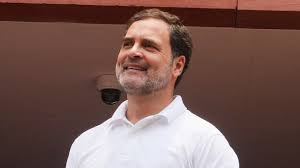Congress ‘fell short’ of understanding OBC issues, opened up space for BJP, says Rahul Gandhi

In a candid reflection on the political journey of the Congress party, senior leader Rahul Gandhi has acknowledged that the party failed to adequately understand and address the concerns of Other Backward Classes (OBCs). This shortcoming, he said, created a political vacuum that was effectively filled by the Bharatiya Janata Party (BJP). Gandhi’s remarks underline a rare moment of introspection from the Congress, which has been struggling to regain its foothold in Indian politics after successive electoral defeats.
Acknowledging the Gaps
Speaking during an interaction with party workers and youth leaders, Rahul Gandhi admitted that Congress had historically played a significant role in empowering marginalized communities but lacked a sustained strategy to address the evolving aspirations of OBC groups. “We fell short in understanding the core issues of the OBCs. This opened up a space that the BJP utilized to position itself as a champion of backward communities,” Gandhi said.
He further added that OBCs, who form a large voting bloc in India, often feel excluded from the policy-making process. According to him, while the Congress has long championed social justice, the party’s failure to evolve with changing socio-economic dynamics left it disconnected from the very communities it claimed to represent.
The Rise of BJP Among OBCs
Gandhi’s admission highlights a significant shift in Indian politics over the past decade. The BJP has successfully mobilized OBC voters through targeted outreach and by promoting leaders from backward classes to key positions. Prime Minister Narendra Modi, himself from an OBC background, has often emphasized his humble origins as part of the BJP’s narrative to appeal to backward communities.
The Congress, on the other hand, has struggled to shed its image as a party of the elite. Analysts argue that the party’s disconnect with grassroots communities, combined with internal organizational challenges, allowed the BJP to fill the vacuum with a strong narrative of empowerment, nationalism, and welfare schemes tailored for backward groups.
Call for Greater OBC Representation
Rahul Gandhi stressed that it is time for Congress to not just speak for marginalized groups but also ensure their strong representation in leadership roles. He reiterated his commitment to the idea of caste census—a topic that has recently gained momentum across the political spectrum. “We must know the real numbers of backward communities and ensure their share in power structures is fair. This is not just a political necessity but also a moral obligation,” he said.
The caste census, Gandhi argued, would serve as a foundation for developing targeted welfare policies. He pointed out that while the BJP talks about OBC empowerment, its policies have often benefited only a select few, leaving the majority of backward classes still fighting for basic opportunities.
Rebuilding Trust With Marginalized Communities
Gandhi’s remarks come at a crucial time when Congress is trying to reinvent itself ahead of upcoming state elections and the 2029 Lok Sabha polls. To regain lost ground, the party has been conducting outreach programs, including the Bharat Jodo Yatra and its second phase, Bharat Jodo Nyay Yatra, focusing on issues of social justice, employment, and economic inequality.
“Congress must be the voice of those who have been left out of development narratives. We need to rebuild trust by showing that we understand their struggles, not just during elections but throughout our political work,” Gandhi said.
Political Reactions
Rahul Gandhi’s statement has sparked a wave of reactions across political circles. BJP leaders have dismissed his remarks as “damage control,” accusing Congress of suddenly shifting its focus to OBC issues only to counter the BJP’s popularity. Union ministers have pointed out that Congress had decades in power but failed to bring substantial changes in the lives of backward communities.
On the other hand, leaders from regional parties such as Samajwadi Party and Rashtriya Janata Dal (RJD)—who have traditionally championed OBC causes—welcomed Gandhi’s stance on caste census but expressed skepticism about whether Congress would implement meaningful changes within its own ranks.
Shaping Congress’ Future Narrative
For Congress, acknowledging past mistakes is seen as the first step toward reviving its political fortunes. Political analysts note that Gandhi’s statement could mark a shift in the party’s strategy to focus on grassroots empowerment and inclusive politics. By openly talking about its gaps, Congress is attempting to show a more self-aware and reform-oriented face to the electorate.
However, success will depend on the party’s ability to translate this rhetoric into action. Increasing the representation of OBC leaders in state units, promoting young grassroots activists, and building alliances with like-minded parties could be the way forward.
Conclusion
Rahul Gandhi’s candid admission about Congress’s failure to fully understand OBC issues reflects a broader realization within the party that it must reconnect with India’s vast and diverse population base. As the BJP continues to consolidate its position among backward communities, Congress faces the dual challenge of rebuilding trust and presenting a compelling alternative narrative of empowerment, equality, and social justice.
Whether Gandhi’s remarks will lead to tangible policy shifts or remain a part of political rhetoric is yet to be seen. But one thing is clear: the battle for the OBC vote bank will play a decisive role in shaping India’s political future, and Congress cannot afford to remain complacent.






